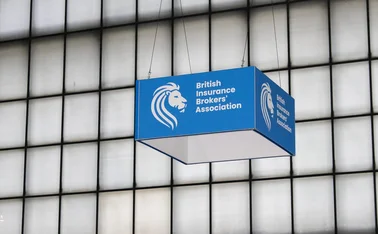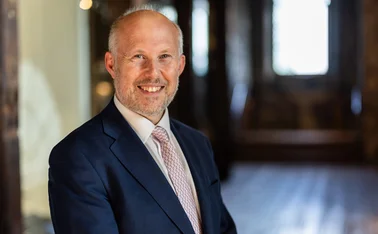
Insurance United Against Dementia calls on industry to help raise £10m for research institute

Need to know
- Dementia and Alzheimer's related deaths jumped by a fifth in 2015 meaning it overtook heart disease.
- It is fitting that one of the oldest industries should lead the way in helping to find a common cause to tackle the greatest killer disease.
- It is in the interest of business to find a cure and to fund better care research and provision.
Campaign aims to unite the sector against the biggest cause of death in UK
Insurance United Against Dementia formally launched this month with the support of the Alzheimer’s Society – the charity’s first industry specific action group tasked with raising funds for the University College London Dementia Research Institute, a new hub for clinical research into various forms of the disease.
According to the Office for National Statistics dementia and Alzheimer’s related deaths jumped by one-fifth in 2015 meaning it overtook heart disease as the biggest killer in England and Wales, accounting for almost one in eight deaths – a total of 61,686 people.
More pertinently in terms of the impact on the insurance industry, it has been estimated that the cost of dementia to UK businesses will more than double to £3bn by 2030, while the cost of skills and experience lost to the workforce will rise to £1.16bn from £628m.
Chris Wallace, director for Continental Europe at QBE, who chairs the IUAD board, said: “It is fitting that one of the oldest industries should lead the way in helping to find a common cause to tackle the greatest killer disease that exists in this country. It is a wonderful story and a fantastic opportunity to unite the industry against dementia; to unite it against a disease, about which nearly everyone I speak to has a personal story.”
Fellow board member Benedict Burke, chief client officer for International at Crawford & Company, added: “Over and above the motivation of creating energy for a great cause there are also empirical facts to consider. The return on investment argument is a strong one, when you think about the cost of dementia to UK businesses.
“There is a collective business reason given the hard numbers involved and that should not be underestimated. It is in the interest of business to find a cure and to fund better care research and provision. There is a dual rationale to this. And that is important.”
Wallace said: “You only have to look at this in terms of changing work patterns. Some people will need to take time off work to help with care; others will start to think about their personal situations and their employers will have to provide a greater level of support.
“As such, one of the roles of the campaign is to position the society as a direct partner in providing access to support services to employees of brokers, carriers and suppliers. We will be reaching out to the industry through 2017 to get this message across.”
Translating the figures on dementia into the insurance sector – based on the Association of British Insurers’ analysis of how many people are employed in the UK insurance industry – 3340 [or 1%] might currently care for someone with dementia and 485 could develop the disease in their working life [under 65].
In the beginning
The genesis of IUAD can be traced to Wallace, Burke and fellow board member, Lockton partner Paul Jack, sharing their own personal experiences of Alzheimer’s disease, the most prominent form of dementia.
In Wallace’s case his story relates to his nan: “It is a horrible, tortuous process watching someone you care and love go through a journey with what is a nasty deteriorating disease where the victim disappears – in essence – in front of your own eyes.”
For Burke, his personal experience was even closer to home: “My mother was the head of English at a secondary school and all the way through my childhood I remember her as the ‘rock’ of the family.
“I am one of four children; she got us through our exams, taught us about literature and the arts and was always so encouraging. But then this ‘rock’ started to crumble. I didn’t spot her deterioration at first; it crept up on her. Then my father noticed her short-term memory loss, and he and my sisters organised to see a consultant and she was diagnosed with Alzheimer’s disease.
“My mother disappeared, mind and body, from us within three years. Her crumbled state was just so difficult to see.”
The losses have stayed with both, and led Wallace two years ago to approach the Alzheimer’s Society to ask whether he could help the charity with its strategic planning.
Having initially been directed to rattle a bucket in Westminster, he phoned the society’s head office to outline his business credentials, which proved opportune given the charity was exploring a new business model where it brought together industry figureheads to contribute to raising money for the DRI.
“Since then I have worked with the society on a strategy that led to me to being appointed onto the Alzheimer’s Society Appeal Board last year, and from there it has asked me whether I could go first with an industry campaign to raise awareness about dementia, and help contribute and support the fundraising for the DRI.”
Jeremy Hughes, CEO at the charity, said: “Alzheimer’s Society is launching an ambitious new deal on dementia in 2017, and we have chosen to work with the IUAD to lead the way in driving awareness and raising support for pioneering research.
“We can and must do more to beat this devastating condition and with the power of the insurance sector behind us we will be able to fund ground-breaking research into treatment, better care and, ultimately, a cure.”
High profile board
Burke and Jack were among the first people to sign up to join the board, a group that has now grown with such high-profile additions as Airmic technical director Julia Graham, Chartered Insurance Institute CEO Sian Fisher and Swiss Re UK and Ireland CEO Frank O'Neil.
Wallace explained: “The thing that has really shocked me is how many this story touches; the number of people in the industry who have told me ‘I’m in’, when I have mentioned the IUAD, before we have even formally launched.
“There is a strong appeal and it is largely driven by the fact when you look at the official stats close to one in two people will have been touched by either Alzheimer’s or dementia.
Burke continued: “When working with the insurance community you do not have to speak with too many people until you come across a colleague, a client, a competitor who has been ‘touched’ in some way by Alzheimer’s and so I applaud the IUAD’s vision for what can be a transformational appeal around care and cure; that importantly brings the insurance market together in a singular way.
“A market that trades every day with each other; that competes every day with each other and which then comes together can collectively be very powerful. This is a higher order cause, which asks us to put aside our competitive spirit and come together to seek to support The Alzheimer’s Society and its’ partners that are doing good things. I have not seen anything like that in my career and that I believe is a unique selling point for people to get involved and contribute.”
Next steps
In terms of next steps, Wallace and Burke are keen to seek new members for the IUAD board, with representation from the regional broking, personal lines and life sectors obvious gaps in the collective skill set.
As an objective, the IUAD aims to raise £10m over the next five years towards the Alzheimer’s Society’s stated ambition of contributing £50m towards the DRI, through personal donations, corporate sponsorship and private events, the first of which is planned for September this year.
With regards corporate sponsorship, the board hopes its awareness raising will mean Alzheimer’s Society being on the shortlist when every insurance business choses a charitable partner. Presently Axa UK and XL Catlin corporately support Azheimer’s Reasearch, while Aon UK backs Dementia UK.
Wallace said: “Dementia is now on everyone’s radar. The government has referenced and have invested in it; the G8 summit has had a dementia debate; and the media have started to talk about it more frequently.
“So while in the past it might not have had the publicity of other diseases like cancer, things are changing. The phrase I am using is that ‘now is the time’. And it’s the time for providers like Alzheimer’s Society to stand up and help support people, employers, families and carers to try and cope with the disease.”
Burke added: “It is really important that this project is not seen as undermining other important causes. If your father was dying of pancreatic cancer – as mine did – you would be pretty annoyed if we were saying ‘we are the only special case’.
“These are all great causes. But given the overwhelming impact of dementia when contrasted with the previous poor investment in care and cure research, the lack of progress, and the effect it has on the wider community and businesses, that the cause stands up well to the challenge [of why the insurance industry should support IUAD].”
Government support
The government’s support, especially its own contribution of £150m towards the DRI and stated objective to make the UK ‘the most dementia friendly place in the world’, is important in helping the IUAD get its message across, Burke concludes.
“If the government was ignoring or was passive around dementia then it would be a harder sell because it would be a case of ‘why us?’,” he said.
“But the government has invested wisely and it is now reasonable to ask for support from the wider society – and the insurance industry is part of that society. So now we have this vehicle that has been created with the purpose of raising funds to support research – as well as care in the community – then we should all get behind it.”
Board: Insurance United Against Dementia
Chair: Chris Wallace, director, Continental Europe, QBE Europe
Benedict Burke, chief client officer International, Crawford & Company
Richard Dudley, CEO global broking centre, Aon Risk Solutions
Sian Fisher, CEO, Chartered Insurance Institute
Julia Graham, technical director, Association of Insurance and Risk Managers
Clare Hatcher, risk solutions analyst, QBE
Paul Jack, chief broking officer, Lockton
Phil Jacobs, chief broking officer, marine, Willis Towers Watson
Ian Livsey, CEO, Institute of Risk Management
Charlotte Matier, IUAD lead, Alzheimer’s Society
Frank O’Neill, CEO, UK and Ireland, Swiss Re
Laura Smith, philanthropy manager, Alzheimer’s Society
Jonathan Swift, content director, insurance division, Incisive Media
Roy White, CEO, Specialties, Marsh UK
Contact
To contact the IUAD, please email iuad@alzheimers.org.uk
To find out more about dementia, visit www.alzheimers.org.uk
Only users who have a paid subscription or are part of a corporate subscription are able to print or copy content.
To access these options, along with all other subscription benefits, please contact info@postonline.co.uk or view our subscription options here: http://subscriptions.postonline.co.uk/subscribe
You are currently unable to print this content. Please contact info@postonline.co.uk to find out more.
You are currently unable to copy this content. Please contact info@postonline.co.uk to find out more.
Copyright Infopro Digital Limited. All rights reserved.
As outlined in our terms and conditions, https://www.infopro-digital.com/terms-and-conditions/subscriptions/ (point 2.4), printing is limited to a single copy.
If you would like to purchase additional rights please email info@postonline.co.uk
Copyright Infopro Digital Limited. All rights reserved.
You may share this content using our article tools. As outlined in our terms and conditions, https://www.infopro-digital.com/terms-and-conditions/subscriptions/ (clause 2.4), an Authorised User may only make one copy of the materials for their own personal use. You must also comply with the restrictions in clause 2.5.
If you would like to purchase additional rights please email info@postonline.co.uk








